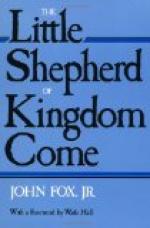It was a strange procession that left the gate of the Turner cabin next morning. Old Joel led the way, mounted, with “ole Sal,” his rifle, across his saddle-bow. Behind him came Mother Turner and Melissa on foot and Chad with his rifle over his left shoulder, and leading Jack by a string with his right hand. Behind them slouched Tall Tom with his rifle and Dolph and Rube, each with a huge old-fashioned horse-pistol swinging from his right hip. Last strode the school-master. The cabin was left deserted—the hospitable door held closed by a deer-skin latch caught to a wooden pin outside.
It was a strange humiliation to Jack thus to be led along the highway, like a criminal going to the gallows. There was no power on earth that could have moved him from Chad’s side, other than the boy’s own command—but old Joel had sworn that he would keep the dog tied and the old hunter always kept his word. He had sworn, too, that Jack should have a fair trial. Therefore, the guns—and the school-master walked with his hands behind him and his eyes on the ground: he feared trouble.
Half a mile up the river and to one side of the road, a space of some thirty feet square had been cut into a patch of rhododendron and filled with rude benches of slabs—in front of which was a rough platform on which sat a home-made, cane-bottomed chair. Except for the opening from the road, the space was walled with a circle of living green through which the sun dappled the benches with quivering disks of yellow light—and, high above, great poplars and oaks arched their mighty heads. It was an open-air “meeting-house” where the circuit-rider preached during his summer circuit and there the trial was to take place.
Already a crowd was idling, whittling, gossiping in the road, when the Turner cavalcade came in sight—and for ten miles up and down the river people were coming in for the trial
“Mornin’, gentlemen,” said old Joel, gravely.
“Mornin’,” answered several, among whom was the Squire, who eyed Joel’s gun and the guns coming up the road.
“Squirrel-huntin’?” he asked and, as the old hunter did not answer, he added, sharply:
“Air you afeerd, Joel Turner, that you ain’t a-goin’ to git justice from me?”
“I don’t keer whar it comes from,” said Joel, grimly—“but I’m a-goin’ to have it.”
It was plain that the old man not only was making no plea for sympathy, but was alienating the little he had: and what he had was very little, for who but a lover of dogs can give full sympathy to his kind? And, then, Jack was believed to be guilty. It was curious to see how each Dillon shrank unconsciously as the Turners gathered—all but Jerry, one of the giant twins. He always stood his ground—fearing nor man, nor dog—nor devil.
Ten minutes later, the Squire took his seat on the platform, while the circuit-rider squatted down beside him. The crowd, men and women and children, took the rough benches. To one side sat and stood the Dillons, old Tad and little Tad, Daws, Nance, and others of the tribe. Straight in front of the Squire gathered the Turners about Melissa and Chad—and Jack as a centre—with Jack squatted on his hanches foremost of all, facing the Squire with grave dignity and looking at none else save, occasionally, the old hunter or his little master.




